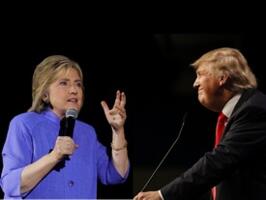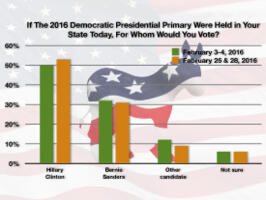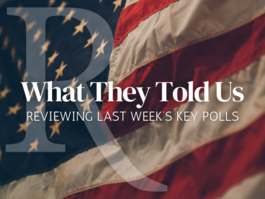Regulating the Future By John Stossel
Government pretends it's the cause of progress. Then it strangles innovation.

Government pretends it's the cause of progress. Then it strangles innovation.

It is true. You simply cannot trust a politician as far as you can throw them.

As the dust settles from Super Tuesday, we think the race is the same now as it was before the voting: Donald Trump and Hillary Clinton are the favorites to win their respective nominations.

Donald Trump may still be winning Republican state primaries, but Hillary Clinton has now moved ahead of him in a hypothetical presidential matchup.

The "Super Tuesday" primaries may be a turning point for America -- and quite possibly a turn for the worse. After seven long years of domestic disasters and increasing international dangers, the next President of the United States will need extraordinary wisdom, maturity, depth of knowledge and personal character to rescue America.

When tracking President Obama’s job approval on a daily basis, people sometimes get so caught up in the day-to-day fluctuations that they miss the bigger picture. To look at the longer-term trends, Rasmussen Reports compiles the numbers on a full-month basis, and the results can be seen in the graphics below.

The first four Republican contests -- Iowa, New Hampshire, South Carolina and Nevada -- produced record turnouts.

In last Thursday's slam-bang Republican debate everyone saw Marco Rubio and Ted Cruz do a fine job of demonstrating Donald Trump's ignorance and inconsistencies. But many may not have noticed Cruz's citation of a Feb. 9 Wall Street Journal article that casts light on the immigration issue -- and suggests strongly that Cruz's and Rubio's serious immigration policies could prove more effective than Trump's bombast about building a wall and getting Mexico to pay for it.

Republicans and unaffiliated voters are more likely than Democrats to have changed candidates as a result of the 10 GOP and six Democratic presidential campaign debates. But most voters who have followed the debates are pretty much where they were before it all began.

Twenty-nine percent (29%) of Likely U.S. Voters think the country is heading in the right direction, according to a new Rasmussen Reports national telephone survey for the week ending February 25.

Americans overwhelmingly believe the ongoing water contamination crisis in Flint, Michigan, is primarily a state and local responsibility and think the public outcry by prominent officials like President Obama and Hillary Clinton is more about politics than a solution to the problem.

More Democrats than ever now support Hillary Clinton’s bid for their party’s presidential nomination.

Here comes Super Tuesday, this year’s political Groundhog Day when we’ll find out whether the Republican presidential slugfest is over or bound to continue a while longer. Nearly 600 GOP delegates are at stake in primaries and caucuses throughout the country.

This Sunday’s 88th Academy Awards are marred by controversy over a lack of diversity among the nominees, but viewers don't seem to mind.

In a Hillary Clinton vs. Donald Trump race -- which, the Beltway keening aside, seems the probable outcome of the primaries -- what are the odds the GOP can take the White House, Congress and the Supreme Court?

Does Donald Trump's big win in the Nevada caucuses mean he's the inevitable Republican nominee? He has made himself the favorite and could sew up the nomination with the first winner-take-all primaries March 15. But it's not inevitable that he will become the nominee. The question is how others can prevent it.
Trump won 46 percent in Nevada; Marco Rubio won 24 percent, and Ted Cruz won 21 percent. That's in line with polling, which showed Nevada to be one of the best Trump states.

Decisive victories in South Carolina and Nevada have Republican voters more certain than ever that Donald Trump will be their party’s nominee heading into Super Tuesday.

President Obama this week renewed his effort to close the prison camp for suspected terrorists at the U.S. Guantanamo Naval Base in Cuba. Most voters still oppose that idea, don’t want the prisoners being jailed here and think the ones that have been released already are again a threat to the United States.

This is the second part of a two-part series analyzing the flood of primaries and in both parties from now through March 15. Last week we looked at the Republicans, and this week we look at the Democrats.